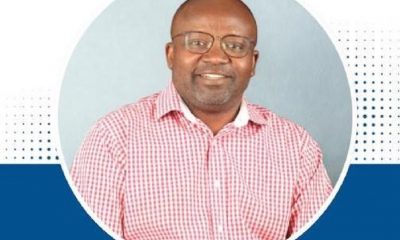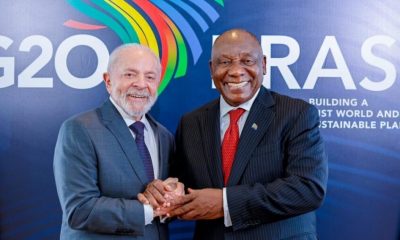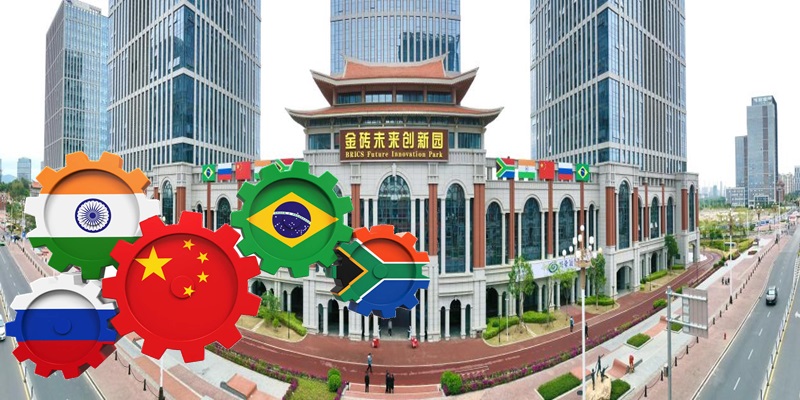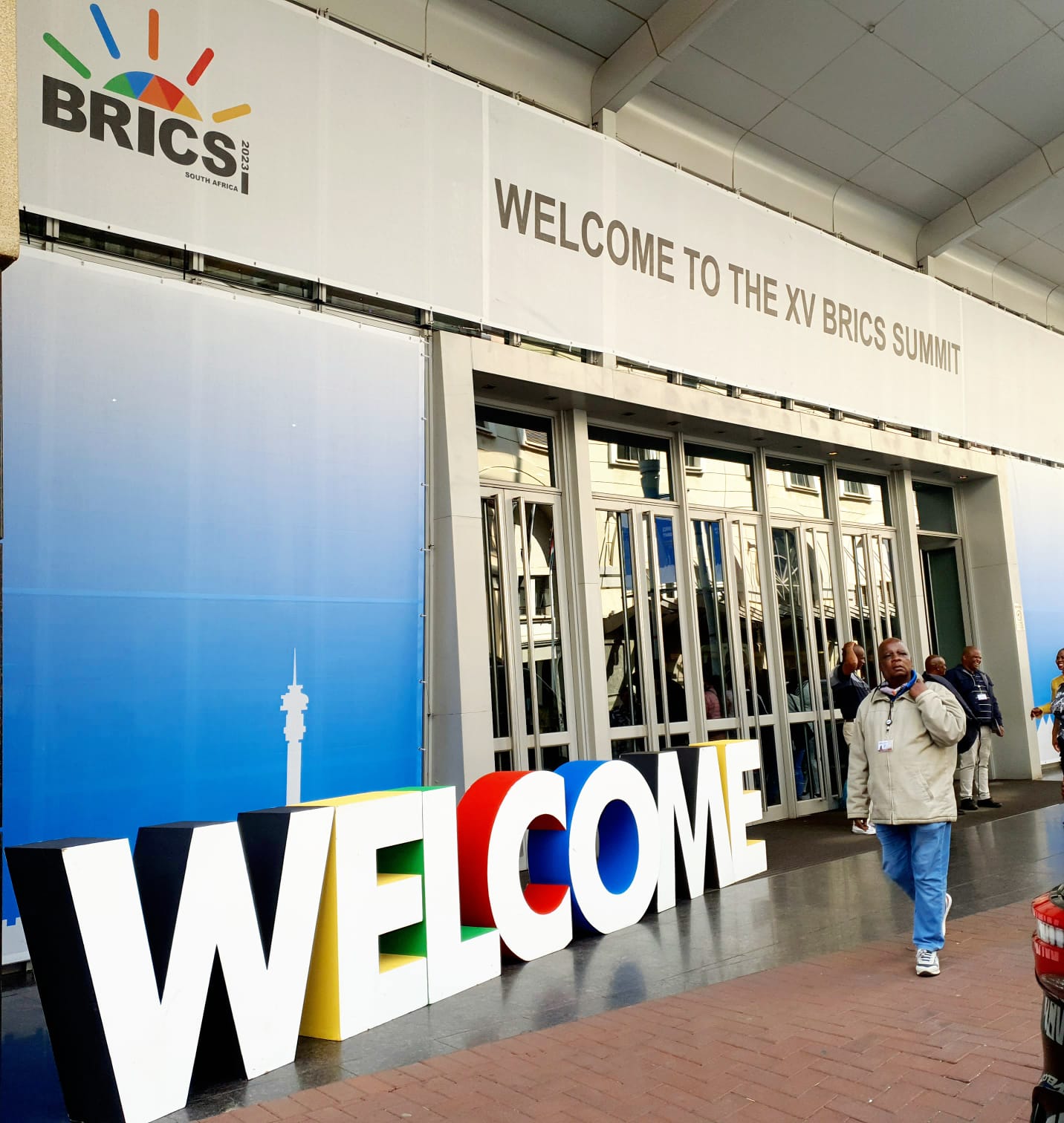World
BRICS and Establishment of Global Socio-Cultural Architecture
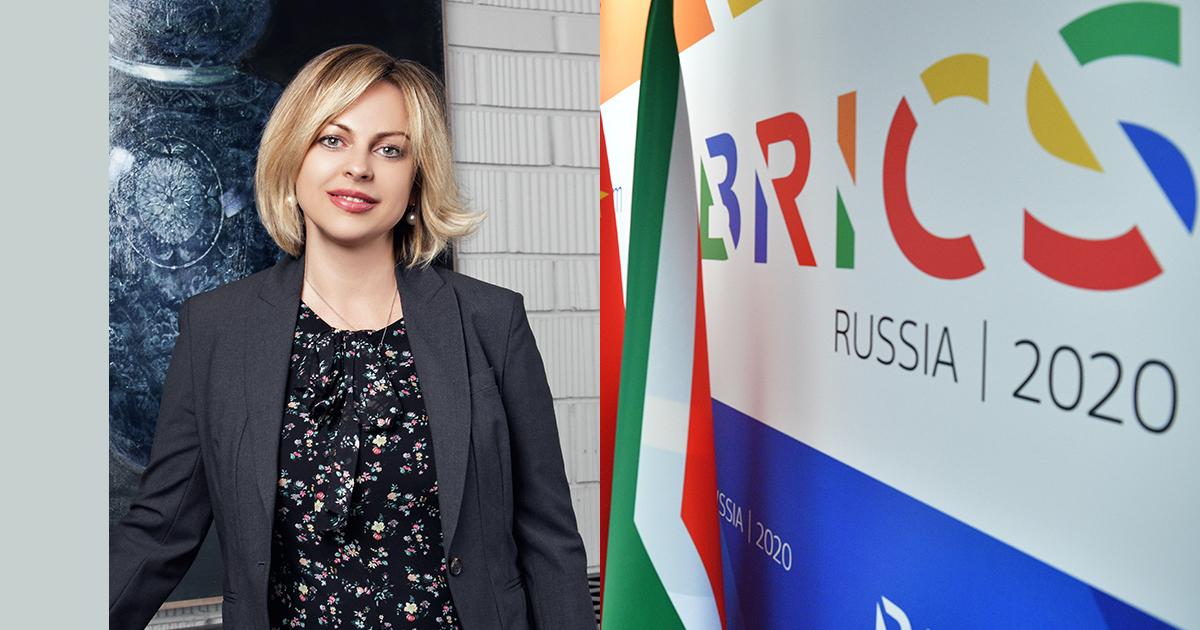
By Kester Kenn Klomegah
Several reports have already appeared on aspects of cultural dimensions of BRICS (Brazil, Russia, India, China and South Africa).
Admittedly, BRICS has broadened its scope of operations and activities, indicating its strength and the level of its development. As already known, Russia has passed on the BRICS Chairmanship to India, which officially starts January 2021. That, however, Kester Kenn Klomegah from Modern Diplomacy contacted to know a few more detailed developments in the cultural directions of BRICS.
Elena Marinina, Co-Chair of the International Cultural Exchange Group of the BRICS Civil Forum, Deputy CEO of the Roscongress Foundation and Director of the Innosocium Foundation, discusses the question of cultural diversities among BRICS members, the various initiatives that were adopted during the last interactive working session, and combined efforts to pave the way forward with the Association of NGOs as part of BRICS. Here are the interview excerpts:
How do you assess the importance and the results of the online roundtable discussions on “International Cultural Cooperation for Strengthening BRICS Unity” moderated from Moscow?
A lot of serious preparatory work went into the roundtable at the BRICS Civil Forum. The International Cultural Exchange Working Group collected recommendations and initiatives from representatives of various public organizations and institutions, foundations, and socially-oriented businesses of the five BRICS countries. All of these recommendations and initiatives were presented during the roundtable, given a serious and balanced assessment.
Cultural exchanges, protecting the cultural heritage of our countries, getting young people involved in the culture of BRICS countries, and developing tourism are the priority focuses that formed the basis of our draft communiqué that was presented to the heads of state at the BRICS Summit under the presidency of the Russian Federation. All the members of the working group, which included more than 30 representatives of the alliance’s member states, agreed that we should join efforts to develop sustainable cultural cooperation between BRICS countries.
It is crucial that all the recommendations are very clear, whether it is the establishment of the BRICS Advanced Thinking and Research Centre or an internship programme for the different activities of young professionals, holding the annual BRICS Literature Fair, or the creation of a general register of cultural, architectural, and landscape monuments of BRICS member states with their subsequent inclusion in the World Heritage List. In other words, we not only outlined paths for further cultural cooperation between our countries, but also identified specific projects that will establish this cooperation.
Of course, we must also keep in mind that many of the projects that have been announced overlap with the competencies of other working groups, which once again demonstrates the diversity and breadth of the coverage of such a phenomenon as a culture. Along with the economy, culture is the foundation on which countries build relations.
In your opinion as a member of the BRICS Working Group on Culture, do you agree that there are some diversities in culture among the group? Russia, India and China are geographically close, Brazil and South Africa a bit distant – but do this present any challenges in realizing fully the expected tourism and cultural dimension of BRICS?
The vision of man and the world is truly distinct for different nations, and sometimes even the exact opposite in some ways. If we are talking about culture, uniformity is unacceptable even within a single country. The main thing that unites the representatives of BRICS countries, though, is the desire to speak from a unified position on the global development of civil society and the establishment of global socio-cultural architecture, and in this regard, the diversity of the cultural codes of BRICS is more of a unique advantage than a disadvantage. We understand this very well in Russia. As a multinational, multicultural, and multilingual country, Russia is always open to dialogue with other peoples. We see the same approach from our foreign partners.
We are already actively collaborating with representatives of BRICS member countries as part of the events of the Roscongress Foundation’s social platform – the Innosocium Foundation. For example, we recently launched the BRICS Women’s Business Alliance, whose agenda not only covers economic issues, but also cross-cultural exchange and the implementation of joint projects in creative industries and education. The upcoming Eurasian Women’s Forum, which will be held in September 2021 in St. Petersburg, will feature a discussion platform on women’s involvement in the creative economy. As the organizers of Russian Creativity Week, we are also looking forward to seeing creative representatives from BRICS countries at our event in Moscow in summer 2021.
As for tourism, the deterrent today is not so much the geographical position of countries as it is the closure of borders due to the pandemic. However, this is a temporary factor. The final recommendations of the International Cultural Exchange Working Group are designed for a longer horizon and contain a wide range of measures that aim to develop the tourism potential of BRICS countries. This primarily includes the BRICS Cultural Tourism project, which seeks to consider the possibility of direct communication between BRICS nations, simplify the visa procedure for citizens of BRICS countries, open guide schools, and develop tourism routes in the group’s countries. We are also planning to hold the annual five-nation ‘BRICS – Our Common Home’ Cultural Festival, the ‘Great BRICS Cities’ project, various championships, and several other interesting initiatives.
One thing I am definitely certain of is that with all the differences in lifestyle, mentality, and traditions, as we travel or communicate and learn about the culture of another country, we are building a policy of intercultural relations and erecting a big BRICS house brick by brick, where common moral values will shape its foundation.
Could you discuss some of the initiatives that were presented during the meeting? What initiatives presented by Russia, the Chair of BRICS 2020? What were the reactions of your colleagues from Brazil, India, China and South Africa?
First of all, I would like to remind you that the BRICS Civil Forum itself was launched in 2015 based on an initiative put forward during the Russian presidency in order to convey the priorities of society and present civil initiatives to the leaders of the five countries. Over the past years, this format has proven to be useful and effective for cooperation between the public organizations of the association’s countries.
The 2020 BRICS Civil Forum came up with public initiatives for healthcare during the pandemic as well as social equality and addressed issues concerning the environment and climate change, the development of green energy, civil rights and freedoms, in addition to the role of education and science in human development. As I already mentioned, we devoted great attention to getting young people involved in the culture of BRICS countries, developing cultural exchanges through literature and art, and protecting cultural heritage as the basis for international cooperation and tourism.
In addition, as part of the cultural focus of the BRICS Civil Forum, Russia presented a number of projects dedicated to the 75th anniversary of victory in World War II. These projects include an initiative to establish the ‘World Day of War Veterans’ under a UN resolution, the international project ‘Libraries as Witnesses of the Great Victory’ based on the materials of the national libraries and archives of BRICS countries, and the five-nation literary and historical project ‘BRICS Peoples: Dedicated to War Heroes’.
All these initiatives were included in the final recommendations and not only garnered broad support from our colleagues in BRICS, but also from participants who were invited from other countries in Europe and Asia. We had a comprehensive exchange of views and engaged in fruitful and interesting work.
Taking advantage of this opportunity, we also invited the working group members to the second Russian Creativity Week Festival and Forum in Moscow in summer 2021, which the Innosocium Foundation is organizing jointly with the Russian Cultural Centre. The event was held for the first time in September 2020 and immediately received international recognition, as evidenced both by the scale of foreign participants as well as their active involvement in the event’s programme.
Now judging from the discussion, what could be the best way to systematize and to combine efforts in implementing all these new initiatives and recommendations arrived at the Civil BRICS 2020? In your view, how do you also see the way forward for the Association of NGOs as part of BRICS?
The institutionalization of cultural ties is a key part of our draft communiqué. During the meetings, many Russian and international members of the working group from the five nations advocated for the creation of a ‘Union (Association) of BRICS Non-Governmental Organizations’ and the formation of a single network of BRICS NPOs. I am certain that this will enable us to engage in a clear and properly coordinated manner, hold a constructive dialogue with the leaders of states and governments, and jointly implement the proposals and initiatives that received support at the BRICS Civil Forum.
World
African Visual Art is Distinguished by Colour Expression, Dynamic Form—Kalalb

By Kestér Kenn Klomegâh
In this insightful interview, Natali Kalalb, founder of NAtali KAlalb Art Gallery, discusses her practical experiences of handling Africa’s contemporary arts, her professional journey into the creative industry and entrepreneurship, and also strategies of building cultural partnership as a foundation for Russian-African bilateral relations. Here are the interview excerpts:
Given your experience working with Africa, particularly in promoting contemporary art, how would you assess its impact on Russian-African relations?
Interestingly, my professional journey in Africa began with the work “Afroprima.” It depicted a dark-skinned ballerina, combining African dance and the Russian academic ballet tradition. This painting became a symbol of cultural synthesis—not opposition, but dialogue.
Contemporary African art is rapidly strengthening its place in the world. By 2017, the market was growing so rapidly that Sotheby launched its first separate African auction, bringing together 100 lots from 60 artists from 14 foreign countries, including Algeria, Ghana, Mali, Nigeria, Senegal, and others. That same year during the Autumn season, Louis Vuitton Foundation in Paris hosted a major exhibition dedicated to African art. According to Artnet, sales of contemporary African artists reached $40 million by 2021, a 434% increase in just two years. Today, Sotheby holds African auctions twice a year, and in October 2023, they raised $2.8 million.
In Russia, this process manifests itself through cultural dialogue: exhibitions, studios, and educational initiatives create a space of trust and mutual respect, shaping the understanding of contemporary African art at the local level.
Do you think geopolitical changes are affecting your professional work? What prompted you to create an African art studio?
The international context certainly influences cultural processes. However, my decision to work with African themes was not situational. I was drawn to the expressiveness of African visual language—colour, rhythm, and plastic energy. This theme is practically not represented systematically and professionally in the Russian art scene.
The creation of the studio was a step toward establishing a sustainable platform for cultural exchange and artistic dialogue, where the works of African artists are perceived as a full-fledged part of the global cultural process, rather than an exotic one.
To what extent does African art influence Russian perceptions?
Contemporary African art is gradually changing the perception of the continent. While previously viewed superficially or stereotypically, today viewers are confronted with the depth of artistic expression and the intellectual and aesthetic level of contemporary artists.
Portraits are particularly impactful: they allow us to see not just an abstract image of a “continent,” but a concrete personality, character, and inner dignity. Global market growth data and regular auctions create additional trust in African contemporary art and contribute to its perception as a mature and valuable movement.
Does African art reflect lifestyle and fashion? How does it differ from Russian art?
African art, in my opinion, is at its peak in everyday culture—textiles, ornamentation, bodily movement, rhythm. It interacts organically with fashion, music, interior design, and the urban environment. The Russian artistic tradition is historically more academic and philosophical. African visual art is distinguished by greater colour expression and dynamic form. Nevertheless, both cultures are united by a profound symbolic and spiritual component.
What feedback do you receive on social media?
Audience reactions are generally constructive and engaging. Viewers ask questions about cultural codes, symbolism, and the choice of subjects. The digital environment allows for a diversity of opinions, but a conscious interest and a willingness to engage in cultural dialogue are emerging.
What are the key challenges and achievements of recent years?
Key challenges:
- Limited expert base on African contemporary art in Russia;
- Need for systematic educational outreach;
- Overcoming the perception of African art as exclusively decorative or ethnic.
Key achievements:
- Building a sustainable audience;
- Implementing exhibition and studio projects;
- Strengthening professional cultural interaction and trust in African
contemporary art as a serious artistic movement.
What are your future prospects in the context of cultural diplomacy?
Looking forward, I see the development of joint exhibitions, educational programs, and creative residencies. Cultural diplomacy is a long-term process based on respect and professionalism. If an artistic image is capable of uniting different cultural traditions in a single visual space, it becomes a tool for mutual understanding.
World
Ukraine Reveals Identities of Nigerians Killed Fighting for Russia

By Adedapo Adesanya
The Ukrainian Defence Intelligence (UDI) has identified two Nigerian men, Mr Hamzat Kazeem Kolawole and Mr Mbah Stephen Udoka, allegedly killed while fighting as Russian mercenaries in the war between the two countries ongoing since February 2022.
The development comes after Russia denied knowledge of Nigerians being recruited to fight on the frontlines.
Earlier this week, the Russian Ambassador to Nigeria, Mr Andrey Podyolyshev, said in Abuja that he was not aware of any government-backed programme to recruit Nigerians to fight in the war in Ukraine.
He said if at all such activity existed, it is not connected with the Russian state.
However, in a statement on Thursday, the Ukrainian Defence released photographs of Nigerians killed while defending Russia.
“In the Luhansk region, military intelligence operatives discovered the bodies of two citizens of the Federal Republic of Nigeria — Hamzat Kazeen Kolawole (03.04.1983) and Mbah Stephen Udoka (07.01.1988),” the statement read.
According to the statement, both men served in the 423rd Guards Motor Rifle Regiment (military unit 91701) of the 4th Guards Kantemirovskaya Tank Division of the armed forces of the Russian Federation.
UDI said that they signed contracts with the Russian Army in the second half of 2025 – the deceased Mr Kolawole on August 29 and Mr Udoka on September 28.
“Udoka received no training whatsoever — just five days later, on October 3, he was assigned to the unit and sent to the temporarily occupied territories of Ukraine,” the report read.
It added that no training records for Mr Kolawole have been preserved; however, it is highly likely that he also received no military training, but his wife and three children remain in Nigeria.
Both Nigerians, the report added, were killed in late November during an attempt to storm Ukrainian positions in the Luhansk region.
“They never engaged in a firefight — the mercenaries were eliminated by a drone strike,” UDI stated, warning foreign citizens against travelling to the Russian Federation or taking up any work on the territory of the “aggressor state”.
“A trip to Russia is a real risk of being forced into a suicide assault unit and, ultimately, rotting in Ukrainian soil,” the statement read.
In an investigation earlier this month, CNN reported that hundreds of African men have been enticed to fight for Russia in Ukraine with the promise of civilian jobs and high salaries. However, the media organisation uncovered that they are being deceived or sent to the front lines with little combat training.
CNN said it reviewed hundreds of chats on messaging apps, military contracts, visas, flights and hotel bookings, as well as gathering first-hand accounts from African fighters in Ukraine, to understand just how Russia entices African men to bolster its ranks.
World
Today’s Generation of Entrepreneurs Value Flexibility, Autonomy—McNeal-Weary

By Kestér Kenn Klomegâh
The Young African Leaders Initiative (YALI) is the United States’ signature step to invest in the next generation of African leaders. Since its establishment in 2010 by Obama administration, YALI has offered diverse opportunities, including academic training in leadership, governance skills, organizational development and entrepreneurship, and has connected with thousands of young leaders across Africa. This United States’ policy collaboration benefits both America and Africa by creating stronger partnerships, enhancing mutual prosperity, and ensuring a more stable environment.
In our conversation, Tonya McNeal-Weary, Managing Director at IBS Global Consulting, Inc., Global Headquarters in Detroit, Michigan, has endeavored to discuss, thoroughly, today’s generation of entrepreneurs and also building partnerships as a foundation for driving positive change and innovation in the global marketplace. Here are the excerpts of her conversation:
How would you describe today’s generation of entrepreneurs?
I would describe today’s generation of entrepreneurs as having a digital-first mindset and a fundamental belief that business success and social impact can coexist. Unlike the entrepreneurs before them, they’ve grown up with the internet as a given, enabling them to build global businesses from their laptops and think beyond geographic constraints from day one. They value flexibility and autonomy, often rejecting traditional corporate ladders in favor of building something meaningful on their own terms, even if it means embracing uncertainty and financial risk that previous generations might have avoided.
And those representing the Young African Leaders Initiative, who attended your webinar presentation late January 2026?
The entrepreneurs representing the Young African Leaders Initiative are redefining entrepreneurship on the continent by leveraging their unique perspectives, cultural heritage, and experiences. Their ability to innovate within local contexts while connecting to global opportunities exemplifies how the new wave of entrepreneurs is not confined by geography or conventional expectations.
What were the main issues that formed your ‘lecture’ with them, Young African Leaders Initiative?
The main issues that formed my lecture for the Young African Leaders Initiative were driven by understanding the importance of building successful partnerships when expanding into the United States or any foreign market. During my lecture, I emphasized that forming strategic alliances can help entrepreneurs navigate unfamiliar business environments, access new resources, and foster long-term growth. By understanding how to establish strong and effective partnerships, emerging leaders can position their businesses for sustainable success in global markets. I also discussed the critical factors that contribute to successful partnerships, such as establishing clear communication channels, aligning on shared goals, and cultivating trust between all parties involved. Entrepreneurs must be proactive in seeking out partners who complement their strengths and fill gaps in expertise or resources. It is equally important to conduct thorough due diligence to ensure that potential collaborators share similar values and ethical standards. Ultimately, the seminar aimed to empower YALI entrepreneurs with practical insights and actionable strategies for forging meaningful connections across borders. Building successful partnerships is not only a pathway to business growth but also a foundation for driving positive change and innovation in the global marketplace.
What makes a ‘leader’ today, particularly, in the context of the emerging global business architecture?
In my opinion, a leader in today’s emerging global business architecture must navigate complexity and ambiguity with a fundamentally different skill set than what was previously required. Where traditional leadership emphasized command-and-control and singular vision, contemporary leaders succeed through adaptive thinking and collaborative influence across decentralized networks. Furthermore, emotional intelligence has evolved from a soft skill to a strategic imperative. Today, the effective modern leader must possess deep cross-cultural intelligence, understanding that global business is no longer about exporting one model worldwide but about genuinely integrating diverse perspectives and adapting to local contexts while maintaining coherent values.
Does multinational culture play in its (leadership) formation?
I believe multinational culture plays a profound and arguably essential role in forming the kind of leadership required in today’s global business environment. Leaders who have lived, worked, or deeply engaged across multiple cultural contexts develop a cognitive flexibility that’s difficult to replicate through reading or training alone. More importantly, multinational exposure tends to dismantle the unconscious certainty that one’s own way of doing things is inherently “normal” or “best.” Leaders shaped in multicultural environments often develop a productive discomfort with absolutes; they become more adept at asking questions, seeking input, and recognizing blind spots. This humility and curiosity become strategic assets when building global teams, entering new markets, or navigating geopolitical complexity. However, it’s worth noting that multinational experience alone doesn’t automatically create great leaders. What matters is the depth and quality of cross-cultural engagement, not just the passport stamps. The formation of global leadership is less about where someone has been and more about whether they’ve developed the capacity to see beyond their own cultural lens and genuinely value differences as a source of insight rather than merely tolerating them as an obstacle to overcome.
In the context of heightening geopolitical situation, and with Africa, what would you say, in terms of, people-to-people interaction?
People-to-people interaction is critically important in the African business context, particularly as geopolitical competition intensifies on the continent. In this crowded and often transactional landscape, the depth and authenticity of human relationships can determine whether a business venture succeeds or fails. I spoke on this during my presentation. When business leaders take the time for face-to-face meetings, invest in understanding local priorities rather than imposing external agendas, and build relationships beyond the immediate transaction, they signal a different kind of partnership. The heightened geopolitical situation actually makes this human dimension more vital, not less. As competition increases and narratives clash about whose model of development is best, the businesses and nations that succeed in Africa will likely be those that invest in relationships characterized by reciprocity, respect, and long-term commitment rather than those pursuing quick wins.
How important is it for creating public perception and approach to today’s business?
Interaction between individuals is crucial for shaping public perception, as it influences views in ways that formal communications cannot. We live in a society where word-of-mouth, community networks, and social trust areincredibly important. As a result, a business leader’s behavior in personal interactions, their respect for local customs, their willingness to listen, and their follow-through on commitments have a far-reaching impact that extends well beyond the immediate meeting. The geopolitical dimension amplifies this importance because African nations now have choices. They’re no longer dependent on any single partner and can compare approaches to business.
From the above discussions, how would you describe global business in relation to Africa? Is it directed at creating diverse import dependency?
While it would be too simplistic to say global business is uniformly directed at creating import dependency, the structural patterns that have emerged often produce exactly that outcome, whether by design or as a consequence of how global capital seeks returns. Global financial institutions and trade agreements have historically encouraged African nations to focus on their “comparative advantages” in primary commodities rather than industrial development. The critical question is whether global business can engage with Africa in ways that build productive capacity, transfer technology, develop local talent, and enable countries to manufacture for themselves and for export—or whether the economic incentives and power irregularities make this structurally unlikely without deliberate policy intervention.
-

 Feature/OPED6 years ago
Feature/OPED6 years agoDavos was Different this year
-
Travel/Tourism10 years ago
Lagos Seals Western Lodge Hotel In Ikorodu
-

 Showbiz3 years ago
Showbiz3 years agoEstranged Lover Releases Videos of Empress Njamah Bathing
-

 Banking8 years ago
Banking8 years agoSort Codes of GTBank Branches in Nigeria
-

 Economy3 years ago
Economy3 years agoSubsidy Removal: CNG at N130 Per Litre Cheaper Than Petrol—IPMAN
-

 Banking3 years ago
Banking3 years agoSort Codes of UBA Branches in Nigeria
-

 Banking3 years ago
Banking3 years agoFirst Bank Announces Planned Downtime
-

 Sports3 years ago
Sports3 years agoHighest Paid Nigerian Footballer – How Much Do Nigerian Footballers Earn


